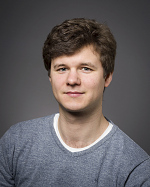The PhD defence will be partially digital, in room 720, Niels Henrik Abels hus and streamed directly using Zoom. The host of the session will moderate the technicalities while the chair of the defence will moderate the disputation.
Ex auditorio questions: the chair of the defence will invite the audience to ask questions ex auditorio at the end of the defence. If you would like to ask a question, click 'Raise hand' and wait to be unmuted.
-
Join the disputation
The webinar opens for participation just before the disputation starts, participants who join early will be put in a waiting room. -
-
Submit request to access (available from 14th June 15:00 until 28th June 15:00)
Trial lecture
27th of June, time: 03:00 pm, room 720 and Zoom.
-
Join the trial lecture
The webinar opens for participation just before the trial lecture starts, participants who join early will be put in a waiting room.
Main research findings
Quantum groups first arose out of the study of integrability in quantum mechanics, presenting a new notion of symmetry extending beyond the traditional group concept. Quantum groups can be thought of as the collection of symmetries of noncommutative spaces, which arise in many areas of modern physics and mathematics.
This thesis deals with two topics in the theory of (operator algebraic) quantum groups.
On the one hand, we study the von Neumann algebras of certain Kac type compact quantum groups. This well-behaved class is amenable to methods from free probability to study their fine analytic structure. We establish several important
properties, such as Connes embeddability and strong 1-boundedness, in a number of examples of these quantum groups.
On the other hand, we apply methods from Poisson—Lie geometry to real simple Lie groups, endowing their Lie algebras with coboundary Lie bialgebra structures. The general deformation theory of such Lie groups is poorly understood, but relations between concrete examples using quantum torsors are known. Our results provide an analogue of this quantum phenomenon in the classical setting.
Adjudication committee
- Professor Benoît Collins, Kyoto University
- Professor Lyudmila Turowska, University of Gothenburg
- Associate Professor Alexander Müller-Hermes, University of Oslo
Supervisors
- Associate Professor Makoto Yamashita, University of Oslo
- Professor Sergiy Neshveyev, University of Oslo
Chair of defence
Professor Erlend Fornæss Wold
Host of the session
Professor Alexander Müller-Hermes
